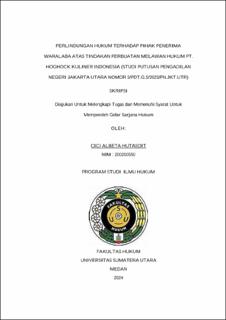| dc.contributor.advisor | Sembiring, Rosnidar | |
| dc.contributor.advisor | Chairi, Zulfi | |
| dc.contributor.author | Hutasoit, Cici Albeta | |
| dc.date.accessioned | 2025-09-09T02:49:46Z | |
| dc.date.available | 2025-09-09T02:49:46Z | |
| dc.date.issued | 2024 | |
| dc.identifier.uri | https://repositori.usu.ac.id/handle/123456789/108322 | |
| dc.description.abstract | Franchising has become a growing phenomenon among entrepreneurs and
the public, but is often faced with legal problems, especially related to franchise
agreements. This study identifies legal problems that arise when a franchisee signs
a franchise agreement, but the business owned by the franchisor has not been
registered as a franchise as happened in Decision Number
3/Pdt.G.S/2023/PN.Jkt.Utr. This is considered an unlawful act because it is
contrary to the applicable provisions. Based on this, there are problems to be
studied, namely the development of franchise agreements in Indonesia, how the
form of unlawful acts in franchise agreements, and how legal protection for
franchisees in Decision Number 3/Pdt.G.S/2023/PN.Jkt.Utr, therefore this study is
entitled “legal protection of franchisees for the unlawful acts of PT Hoghock
Culinary Indonesia (Study of North Jakarta Court Decision Number
3/Pdt.G.S/2023/PN.Jkt.Utr)”.
The method used in writing this thesis is normative juridical, namely using
a statutory approach and a case approach by examining secondary legal materials
by examining legal principles, legal systematics and legislation and studies of
decisions related to franchising.
The conclusion of the research in this thesis shows that the development of
franchise agreements in Indonesia is closely related to the enthusiasm and interest
in franchising. The enthusiasm and interest of business actors in franchising must
also be accompanied by legislation as a legal umbrella in the making of franchise
agreements. In the franchise agreement, the position of the franchisee is considered
weak and vulnerable to legal problems because the making of the franchise
agreement has been standardized by the franchisor. One of the legal problems that
occurs is that the franchisor does not register its business as a franchise but enters
into a franchise agreement with the franchisee. This is said to be an unlawful act
because it fulfills the elements of unlawful acts in Article 1365 of the Civil Code
and violates Article 1320 of the Civil Code and violates Government Regulation
Number 35 of 2024 jo Regulation of the Minister of Trade of the Republic of
Indonesia Number 71 of 2019. As a result of these unlawful acts, the franchise
agreement will be null and void and the franchisor is obliged to compensate for the
losses suffered by the franchisee. | en_US |
| dc.language.iso | id | en_US |
| dc.publisher | Universitas Sumatera Utara | en_US |
| dc.subject | Franchise | en_US |
| dc.subject | Agreement | en_US |
| dc.subject | Wrongful Act | en_US |
| dc.title | Perlindungan Hukum terhadap Pihak Penerima Waralaba Atas Tindakan Perbuatan Melawan Hukum PT. Hoghock Kuliner Indonesia (Studi Putusan Pengadilan Negeri Jakarta Utara Nomor 3/Pdt.G.S/2023/PN.Jkt.Utr) | en_US |
| dc.title.alternative | Legal Protection of Franchisees for the Unlawful Acts of PT Hoghock Culinary Indonesia (Study of North Jakarta Court Decision Number 3/Pdt.G.S/2023/PN.Jkt.Utr) | en_US |
| dc.type | Thesis | en_US |
| dc.identifier.nim | NIM200200550 | |
| dc.identifier.nidn | NIDN0002026602 | |
| dc.identifier.nidn | NIDN0001087102 | |
| dc.identifier.kodeprodi | KODEPRODI74201#Ilmu Hukum | |
| dc.description.pages | 92 Pages | en_US |
| dc.description.type | Skripsi Sarjana | en_US |
| dc.subject.sdgs | SDGs 16. Peace, Justice And Strong Institutions | en_US |


